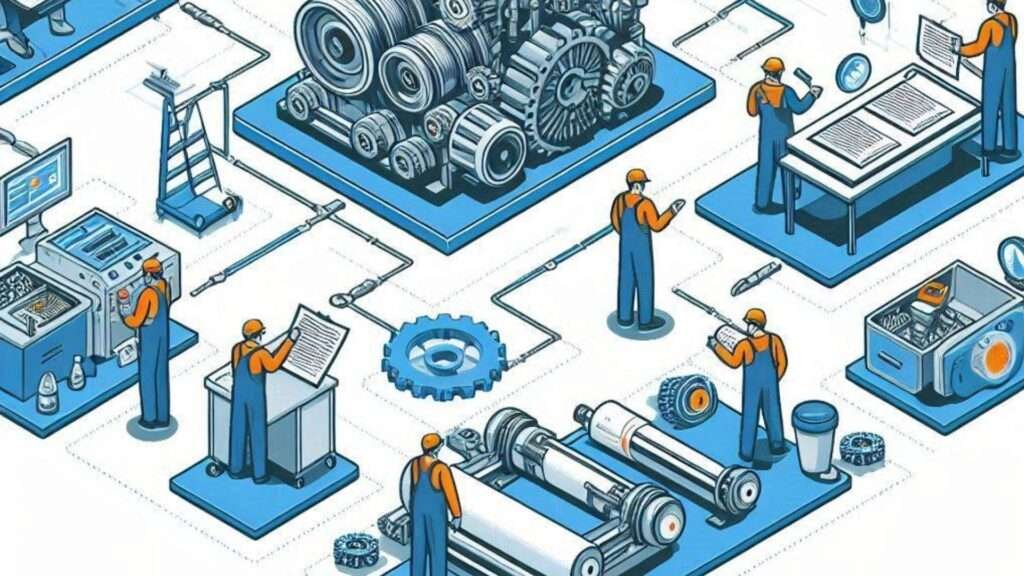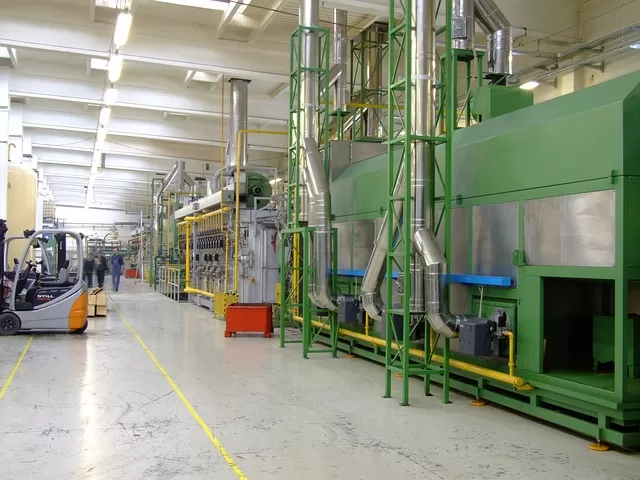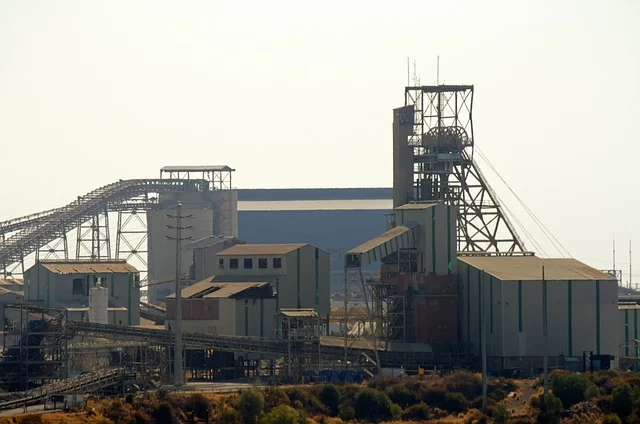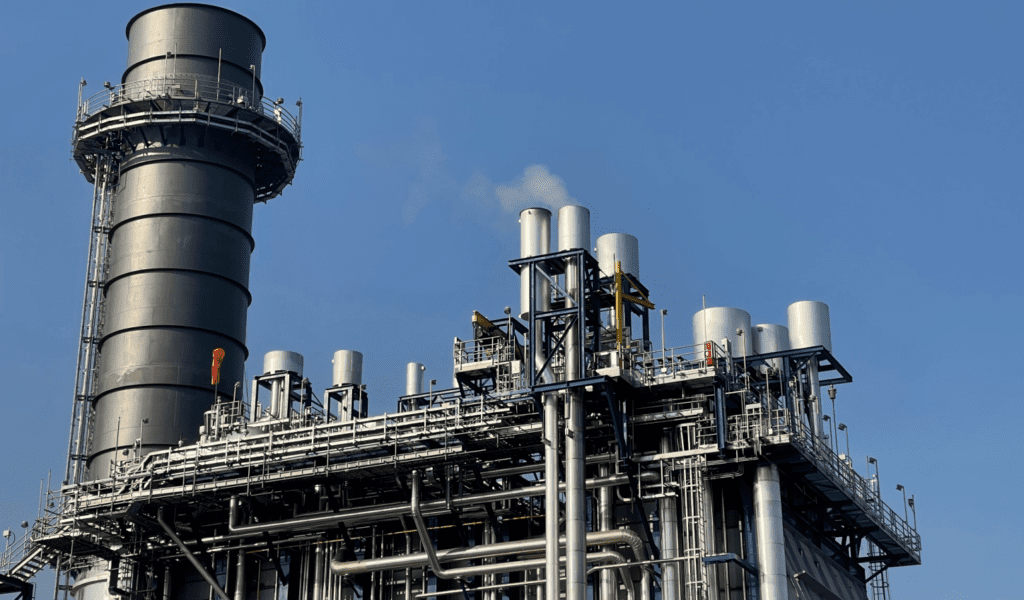Securing An Advertised Role As A Maintenance Planner
The overall effectiveness and efficiency of a company’s
machinery and equipment is heavily reliant on its Maintenance Planner/Scheduler,
and there are a number of important reasons why finding work as one is becoming
increasingly difficult these days:
1.
Industry recognition: As
businesses recognise the importance of effective maintenance planning in
reducing costs and downtime, there is a greater demand for these positions.
2.
Technological advancements: The
need for expertise in specialised software and digital tools raises the entry
barrier to modern maintenance planning.
3.
Increasing competition: As the
position has gained popularity, there are more qualified applicants.
4.
Base Requirements: Employers now expect maintenance planners to
be able to manage projects, analyse data, and continuously improve.
Be sure to read up on the latest asset management techniques
by researching topics such as:
·
The 6 P’s Of
Asset Management.
·
Advances In The Asset
Management Process.
·
Maintenance
Management Functionality.
To make yourself the best-prepared candidate and stand out in
this competitive field, consider the following strategies:
1.
Certifications: Obtain
relevant certifications in Maintenance & Reliability Leadership or
Reliability Engineering Leadership. You might
consider reading a previous article of mine about Asset
Management Training For Planners to help with this.
2.
Software proficiency: Master
popular Computerized
Maintenance Management Systems (CMMS) and Enterprise Asset Management (EAM)
software. Being competent and
experienced with Planning
Maintenance using SAP is always going to be an added bonus.
3.
Continuous learning: Stay
updated on industry trends, new technologies, and best practices in maintenance
planning.
4.
Develop cross-functional skills: Enhance
your knowledge in areas like reliability
& maintenance strategies, project management, materials
management, lean manufacturing and learning about how to lead a
change management project.
5.
Data analysis: Improve
your ability to interpret maintenance data and use it to drive decision-making. Being able to effectively analyse maintenance
performance will help set you apart from other applicants.
6.
Industry-specific knowledge:
Specialize in maintenance planning for specific industries (e.g.,
manufacturing, mining, smelting, refining, oil, gas, healthcare, power and utilities)
to target niche markets.
7.
Networking: Attend industry
conferences, join professional associations, and build connections within the
maintenance community.
8.
Showcase results:
Quantify your achievements in previous roles, demonstrating cost savings,
efficiency improvements, and downtime reductions.
9.
Adaptability:
Highlight your experience with change management and implementing new processes
or technologies.
10. Soft
skills: Emphasize communication, leadership, and problem-solving
abilities, which are crucial in modern maintenance planning roles.
By focusing on these areas, you can enhance your profile and
increase your chances of standing out in a competitive job market.
The
Maintenance Planner is responsible for effectively planning and scheduling
maintenance activities, ensuring that all machinery runs at maximum efficiency,
reducing downtime and increasing equipment life.
This position is critical in any industry that relies on
machinery and equipment for production.
Maintenance planners are responsible for developing
comprehensive maintenance plans that align with an organization’s operational
goals.
To ensure that maintenance tasks are completed on time and
effectively, they carefully plan preventive maintenance schedules, collaborate
with other departments, and manage resources effectively.
They protect the company’s productivity and financial success
by preventing unplanned malfunctions and costly repairs.
Furthermore, the Maintenance Planner’s responsibilities
include examining maintenance data to identify patterns and opportunities for
improvement.
They use maintenance management software to plan work, create
schedule packages, monitor equipment performance, and generate reports
outlining the efficiency of maintenance operations.
These skills allow them to make better recommendations and
decisions, increasing overall operational efficiency.
The Maintenance Planner can be used for purposes other than
operations. Their efforts have a direct impact on the company’s safety and
compliance standards.
Maintenance activities that follow safety protocols and
regulatory requirements benefit all workers in creating a safe working
environment.
Simply put, the Maintenance Planner bridges the gap between
production demands and maintenance activities, serving as an important link in
the operational chain.
The success and longevity of the company are ultimately fueled
by the machinery’s dependability and performance, which is ensured by their
skill and careful planning.
The Challenges of Securing a Maintenance
Planner Position.
There are numerous internal and external factors that
contribute to the intense competition and demands of the field, making it
difficult to obtain a job as a maintenance planner.
Many people apply for jobs in maintenance planning, competing
for the few available positions.
This competitive nature stems from the specialised skill set
required, which includes excellent organisational abilities, a thorough
understanding of maintenance strategies, and proficiency with a variety of
software tools.
Furthermore, the position necessitates a thorough
understanding of technical procedures, tools, and machinery, a requirement that
is frequently met through years of experience and specialised training.
This information is critical because maintenance planners
develop effective maintenance plans to reduce downtime and ensure operational
continuity.
The requirement that candidates be able to anticipate and
resolve potential problems before they arise complicates the selection
process. As a result, the role requires
some reliability engineering skills.
This position carries a large number of responsibilities. In
addition to creating efficient maintenance schedules and plans, maintenance
planners must manage resources, collaborate with multiple departments, and
follow strict safety and legal guidelines.
This complex duty necessitates a high level of accountability
and accuracy, as any oversight can result in serious operational issues and
financial losses.
Furthermore, workers in this field must be committed to
lifelong learning and adaptation, as technology and maintenance procedures are
constantly changing.
To remain current and productive in your position, you must
stay up to date on best practices, technological advancements, and market
trends.
This constant commitment to professional development makes it
more difficult to find and keep a job as a maintenance planner.
In addition to navigating a highly competitive environment,
prospective maintenance planners must have a diverse set of skills, a high
level of responsibility, and flexibility.
Together, these factors make it difficult to find work in this
difficult but rewarding industry.
Key Responsibilities of a Maintenance Planner.
A maintenance planner is responsible for ensuring that an organization’s
operations are efficient and reliable.
One of the main responsibilities is to schedule maintenance
tasks. This entails creating detailed plans outlining when and how maintenance
activities should be performed.
These schedules must be meticulously planned in order to
reduce production disruptions and ensure that all required maintenance is
completed on time.
Managing resources is another important responsibility.
Maintenance planners must effectively allocate both human and material
resources.
This includes scheduling skilled technicians and making sure
that all necessary tools and spare parts are available.
Efficient resource management reduces downtime and delays in
maintenance activities.
Ensuring compliance with safety regulations is an important
part of the maintenance planner’s role.
They must stay up to date on the latest safety standards and
regulations and ensure that all maintenance activities follow these guidelines.
This not only ensures the well-being of the workforce, but it
also helps to avoid legal issues and potential fines.
Maintenance planning requires collaboration with other
departments to be effective.
Maintenance planners must collaborate closely with production,
procurement, and other relevant departments to ensure that maintenance tasks
flow seamlessly into overall operations.
This collaborative approach helps to coordinate maintenance
activities with production schedules and other business priorities.
Developing preventive maintenance strategies is another
important responsibility. Maintenance planners can significantly reduce
downtime by proactively identifying and addressing potential problems before
they become failures.
This includes routine inspections, predictive maintenance
techniques, and the implementation of maintenance best practices.
Preventive maintenance not only improves equipment
reliability, but it also extends asset life, which saves money and increases
operational efficiency.
Skills and Qualifications Required.
To be a successful maintenance planner, you must have both
technical expertise and soft skills.
The position requires a thorough understanding of machinery
and equipment, which are the foundations of most maintenance tasks.
A maintenance planner must understand the various types of
machinery, their operational complexities, and potential problems. This
technical foundation allows for precise planning and efficient problem solving
when equipment fails.
Another important technical skill is familiarity with maintenance
management software.
Today’s maintenance planning relies heavily on computerised
systems to track work orders, schedule preventive maintenance, and manage
inventory.
Familiarity with leading software tools such as CMMS
(Computerized Maintenance Management Systems), EAM (Enterprise Asset
Management) and ERP (Enterprise
Resource Planning) systems is essential.
This expertise ensures that maintenance activities are
seamlessly integrated with overall operational goals, maximising both time and
resource utilisation.
Analytical skills are also essential for a maintenance
planner. The ability to interpret data, identify patterns, and anticipate
potential problems before they worsen can significantly improve maintenance
efficiency.
Analytical skills aid in the development of strategies that
reduce downtime and extend the life of equipment, ultimately contributing to
cost savings and increased productivity.
Soft skills are also important because they allow for more
effective coordination and execution of maintenance tasks.
Communication skills are at the top of the list because a
maintenance planner/scheduler must clearly communicate the schedule, planning
information, status updates, and potential issues to the maintenance and
production teams, as well as other departments.
Strong communication ensures that everyone is on the same
page, reducing the possibility of miscommunication and errors.
Problem-solving abilities are also important. Maintenance
planners frequently encounter unexpected challenges that necessitate quick
thinking and innovative solutions.
An experienced problem solver can navigate these situations
with ease, resulting in minimal disruption to operations.
Finally, effective multitasking and prioritisation require
strong organisational skills.
A successful maintenance planner must be able to manage
multiple responsibilities, such as scheduling maintenance activities and
tracking equipment performance, while adhering to strict deadlines.
This organizational acumen ensures that maintenance operations
run efficiently and without unnecessary delays.
Preparing for a Maintenance Planner Interview.
Preparing for a maintenance planner interview requires a
strategic approach to highlight your expertise and demonstrate your
understanding of the company’s needs.
Initially, thorough research on the company is paramount.
Familiarize yourself with its mission, values, and recent accomplishments.
Delve deeper into the company’s maintenance processes,
methodologies, and any specialized systems they use.
This knowledge will enable you to tailor your responses to
show how your skills and experiences align with their specific requirements.
Understanding the company’s maintenance processes is crucial.
If possible, gather information about their asset management systems,
maintenance schedules, and any predictive maintenance technologies they may
employ.
Being conversant in
these areas allows you to discuss how your background in maintenance planning
can bring value to their operations, showcasing your proactive approach to
minimizing downtime and enhancing productivity.
Articulating your skills and experience effectively is key.
Prepare to discuss your proficiency in creating and managing maintenance
schedules, coordinating with different departments, and ensuring compliance
with safety standards.
Highlight your experience with computerized maintenance
management systems (CMMS), inventory control, and budget management.
Use specific examples from your past roles to illustrate your
problem-solving abilities, leadership qualities, and technical knowledge.
For instance, discussing a time when you successfully reduced
equipment downtime through a strategic maintenance plan can be particularly
impactful.
Common interview questions for a maintenance planner role
often revolve around your technical skills, experience with maintenance
planning software, and your ability to handle unexpected breakdowns.
Practicing answers to these questions will help you articulate
your thoughts clearly and confidently during the interview.
Additionally, preparing questions to ask the interviewer about
the company’s maintenance challenges and goals can demonstrate your genuine
interest and proactive mindset.
A well-rounded preparation involves in-depth research on the
company, a thorough understanding of its maintenance processes, and a strong
articulation of your relevant skills and experiences.
By following these guidelines, you can position yourself as a
knowledgeable and capable candidate ready to take on the role of a maintenance
planner.
Conducting Thorough Research on the Company.
When preparing for an interview for a planner/scheduler
position, extensive research on the company is an important step that should
not be overlooked.
By researching the company’s history, culture, and recent
projects, candidates can gain valuable insights that will allow them to tailor
their responses effectively during the interview process.
Understanding the company’s history lays a solid foundation
for demonstrating your interest and dedication.
This entails reviewing the company’s history, key milestones,
and notable accomplishments.
This allows candidates to align their personal career goals
with the company’s long-term objectives, demonstrating a genuine desire to join
the team.
Understanding the company culture is equally important. This
includes learning about the company’s core values, mission statement, and
workplace culture.
Many businesses take
pride in certain cultural aspects, such as innovation, teamwork, and
sustainability. Demonstrating that you share these values can boost your appeal
as a potential maintenance planner.
In addition to historical and cultural perspectives, it is
critical to investigate the company’s most recent projects and initiatives.
This information is typically available through the company’s
website, press releases, and industry news sources.
Knowing about current projects allows you to discuss how your
skills and experience fit into the company’s needs and future plans.
It is critical to understand the company’s maintenance
strategies, as well as any recent changes or challenges that have arisen.
This could include reviewing case studies, technical papers,
or industry reports.
By emphasising your understanding of these issues, you will be
able to provide informed and relevant responses during the interview,
demonstrating your proactive approach and willingness to contribute
effectively.
Conducting extensive research on the company enables
candidates to present themselves as knowledgeable, dedicated, and culturally
compatible professionals.
This strategic approach not only improves your interview
performance, but also boosts your overall candidature for the maintenance
planner position.
Showcasing Your Maintenance Planning
Expertise.
During an interview, you must effectively demonstrate your
knowledge of maintenance planning in order to position yourself as a top
candidate.
The first step in this process is to demonstrate your
technical knowledge. This requires a thorough understanding of maintenance
management principles, equipment operation, and the maintenance lifecycle.
Prepare to discuss specific methodologies like predictive and
preventive maintenance, as well as your experience successfully implementing
these strategies.
Additionally, your familiarity with maintenance management
software can help you stand out. Many organisations use Computerised
Maintenance Management Systems (CMMS) or Enterprise Asset Management (EAM)
software to streamline their operations.
Highlight your knowledge of these tools, including any
specific software you have used, such as SAP, Pronto, Oracle eAM, Maximo
or Ellipse.
Demonstrate how you used these platforms to improve
maintenance planning, track work orders, manage inventory, and analyse data.
Your ability to create and implement effective maintenance
schedules is also important.
Provide examples of how you’ve developed maintenance plans to
maximise equipment uptime while minimising downtime.
Discuss your scheduling strategy, whether it is
condition-based monitoring, time-based maintenance, or a combination of the
two.
Demonstrate how your scheduling techniques have improved
equipment reliability and operational efficiency.
Additionally, problem-solving abilities are required in the
role of a maintenance planner. Share instances in which you identified and
resolved complex maintenance issues.
Whether you’re troubleshooting equipment failures or
optimising maintenance procedures, your ability to face challenges head on will
demonstrate your worth to prospective employers.
Highlight your history of improving equipment reliability and
process sustainability. Provide quantifiable results, such as reduced unplanned
downtime, increased Mean Time Between Failures, decreased Mean Time To Repair,
and instances where the plan/schedule you created was completed in full, on
time, within budget, and with quality.
These achievements demonstrate your ability to improve
operational performance through effective maintenance planning & scheduling.
The Toughest Maintenance Planner/Scheduler Job
Application Challenges.
Applying for a maintenance planner/scheduler role presents
unique challenges that can be daunting for many candidates.
One significant hurdle is the lack of industry-specific
experience. Many applicants find that their general work experience does not
directly translate into the specialized knowledge required for maintenance
planning.
Another common obstacle is limited technical knowledge.
Maintenance planning often requires a deep understanding of technical processes
and equipment. Engaging in continuous
learning through online courses or technical workshops can enhance technical
proficiency.
Additionally, seeking mentorship from experienced
professionals can provide practical insights and real-world applications of
technical concepts.
Inadequate understanding of maintenance workflows is another
challenge. Maintenance planners must be adept at understanding and optimizing
workflows to ensure efficiency.
Practical strategies to gain this understanding include
shadowing experienced maintenance planners, participating in workflow
simulations and studying case studies of successful maintenance operations.
Difficulty in prioritizing tasks can impede effectiveness in
this role. Effective maintenance planning requires prioritizing tasks based on
urgency and importance.
Practicing problem-solving scenarios and using prioritization
tools such as the Eisenhower Matrix can help in developing this skill.
Poor communication skills can also be a barrier. Maintenance
planners need to communicate effectively with various stakeholders, including
technicians, management, and suppliers.
Improving communication skills through workshops and
practicing active listening can significantly enhance one’s ability to convey
information clearly and effectively.
Lack of project management experience can be mitigated by
taking project management courses and seeking opportunities to lead small
projects.
These experiences build the necessary skills to manage larger
maintenance projects in the future.
Insufficient problem-solving skills can be addressed by
engaging in exercises that challenge critical thinking. Participating in
scenario-based training and problem-solving workshops can enhance these skills.
Difficulty in demonstrating cost-saving measures is another
challenge. Understanding and applying cost-saving strategies in maintenance
operations can be learned through financial analysis courses and studying
successful case studies.
Finally, limited ability to showcase leadership skills is a
common issue. Building leadership capabilities through leadership training
programs and taking on leadership roles in smaller projects or teams can help
in showcasing these skills effectively.
The 9 Best Ways to Demonstrate Your
Maintenance Planning Knowledge.
When applying for a maintenance planner/scheduler role,
showcasing your specialized knowledge and technical expertise is vital.
Below are 9 effective methods (Non CMMS) to
highlight your qualifications:
1.
Obtain Relevant Certifications: Industry
and profession relative certifications demonstrate your commitment to
excellence and mastery of essential maintenance principles. Including these
credentials in your resume and cover letter can significantly strengthen your
application.
2.
Showcase Successful Project Case Studies:
Highlight specific projects where your maintenance planning skills led to
measurable improvements. Detailing the challenges, strategies, and successful
outcomes will exhibit your practical experience and problem-solving abilities.
3.
Attend Industry Conferences and Workshops:
Participation in industry events keeps you updated on the latest trends and
technologies. Mentioning these experiences shows your dedication to continuous
learning and networking within the field.
4.
Join Professional Associations:
Membership in organizations such as the Society for Maintenance &
Reliability Professionals (SMRP) and The Asset Management Council can provide
access to valuable resources and networking opportunities. Highlighting your
active involvement can set you apart as a committed professional.
5.
Participate in Webinars:
Engaging in webinars allows you to stay informed about industry advancements
and best practices. Including these in your professional development activities
demonstrates your proactive approach to learning.
6.
Publish Articles: Writing
articles or whitepapers on maintenance planning topics showcases your expertise
and thought leadership. Share these publications in your LinkedIn profile and
include them as links in your application materials.
7.
Leverage LinkedIn to Share Insights:
Regularly posting insights and engaging with industry content on LinkedIn can
enhance your professional visibility. Highlighting these activities in your
resume can reflect your active engagement with the maintenance community.
8.
Continuously Update Your Knowledge on
Emerging Technologies: Staying informed about new technologies such as
predictive maintenance tools and condition monitoring applications is crucial.
Showcasing your familiarity with these innovations can signal your
forward-thinking approach.
9.
Tailor Your Resume and Cover Letter:
Customize your application materials to reflect the specific skills and
experiences relevant to the maintenance planner/scheduler role. Use concrete
examples and metrics to substantiate your claims, making your expertise
undeniable.
By implementing these strategies, you can effectively
demonstrate your specialized maintenance planning and technical knowledge,
enhancing your prospects of securing the role.
Essential Skills and Qualifications for a
Maintenance Planner/Scheduler.
Securing a role as a maintenance planner/scheduler demands a
robust combination of technical and soft skills. Proficiency in Computerized
Maintenance Management System (CMMS) software is paramount.
These tools facilitate efficient management of maintenance
activities, helping planners/schedulers keep track of work orders, schedules,
and maintenance records.
Additionally, a deep understanding of predictive and
preventive maintenance strategies ensures that machinery and equipment are
maintained proactively, minimizing downtime and extending asset life.
Technical aptitude is further underscored by the ability to
read and interpret technical drawings and schematics.
This skill is crucial for accurately planning maintenance
tasks and ensuring that work is carried out correctly.
Knowledge of asset management principles, including lifecycle
management and cost-benefit analysis, also plays a significant role in
effective maintenance planning.
Alongside technical prowess, soft skills are equally critical.
Strong communication skills enable maintenance planners/schedulers to
effectively convey information to team members, management, and external
vendors.
Team collaboration is essential for coordinating with various
departments and ensuring that maintenance activities align with overall
operational goals.
Problem-solving skills are vital for diagnosing issues and
developing efficient solutions, while time management and organizational
abilities help in prioritizing tasks and managing multiple responsibilities
simultaneously.
In terms of qualifications, a relevant trade background,
maintenance management, PASS55, reliability engineering, project management or
industrial technology can provide a solid foundation for this role.
Additional training or coursework in areas like asset
management, lean manufacturing, or predictive maintenance certification can
further bolster your qualifications.
When presenting these skills and qualifications in your resume
and during interviews, focus on specific examples that demonstrate your
proficiency.
Highlight your experience with CMMS software, successful
implementation of preventive maintenance programs, and instances where your
problem-solving abilities led to significant improvements.
Tailor your resume to the job description, and prepare to
discuss how your background and skills align with the company’s needs during
the interview.
Showcasing Your Maintenance Planning and
Scheduling Abilities in Interviews
Securing a role as a Maintenance Planner/Scheduler requires
adeptly demonstrating your planning and scheduling abilities during job
interviews.
Effectively preparing for common interview questions is the
first step towards success.
Expect questions about how you prioritise work, streamline
processes, and deal with last-minute malfunctions.
Use the STAR (Situation, Task, Action, Result) method to
demonstrate your expertise. Using this methodical approach enables you to give
succinct, precise examples from your prior experiences.
When asked to prioritise tasks, for example, give an example
of a situation in which you had to choose between several high-priority tasks
that needed to be completed.
Give a brief description of the task at hand, the steps you
took to allocate resources effectively, and the successful outcome your
prioritisation strategy produced. This demonstrates your ability to solve
problems as well as your attention to detail and ability to function under
pressure.
In a similar vein, when talking about workflow optimisation,
describe examples of how you have used techniques or software to improve
productivity.
Make sure to include any quantifiable results, like decreased
downtime or increased productivity, to offer hard proof of your technical
know-how.
Managing unplanned malfunctions is another essential component
of the job. Give instances of how your strategic planning and fast thinking
reduced operational disruptions.
Describe how you handle preventive maintenance and
troubleshooting to demonstrate that you are even more prepared for the
position.
Furthermore, you can show that you have a thorough
understanding of the field of maintenance planning and scheduling by posing
intelligent questions during the interview.
Ask about the company’s current maintenance plans, the
difficulties they encounter, and the metrics they use to determine whether
maintenance efforts are successful.
This puts you in a
thoughtful and proactive candidate position while also demonstrating your
sincere interest.








